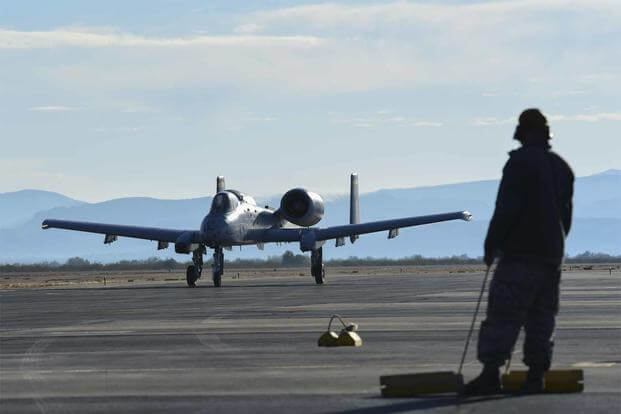The U.S. Air Force wants to move some A-10 Thunderbolt II aircraft and HH-60 Pave Hawk helicopters to Davis-Monthan Air Force Base, Arizona, to centralize close air support and rescue operations while retiring some of the oldest Warthogs in the fleet, the service announced Wednesday.
In an effort to make Davis-Monthan the "Center of Excellence" for those missions, the service said it plans to move the A-10 weapons instructor course and test and evaluation operations from Nellis Air Force Base, Nevada, to the base in 2022, according to a news release. At the same time, some fifth-generation F-35 Joint Strike Fighters and F-22 Raptors will move to Nellis, the service said in a separate release.
Read Next: Army Upgrades 60 Awards for 'Black Hawk Down' Battle
The move is predicated on Congress approving the Air Force's request to get rid of 42 A-10s outlined in its fiscal 2022 budget, an attempt the service has tried before, but to no avail because lawmakers shot it down. Testifying before lawmakers during multiple hearings in recent weeks, officials have said the service can modernize and maintain 218 of the 281 tank-shredding aircraft it currently has, downsizing from nine operational squadrons to seven.
Hundreds of A-10s in the fleet have received new wings or are in the process of receiving upgrades to their wings despite the battle over how many aircraft the service can retire in coming years. The service estimates it has poured $880 million so far into the A-10 re-winging and avionics modernization efforts.
The A-10 is expected to fly into the 2030s and has been grandfathered under the service's "four plus one" model to downsize from its current seven fighter or attack aircraft fleets. In May, Air Force Chief of Staff Gen. Charles "CQ" Brown said the four are the F-35 Lightning II; F-16 Fighting Falcon; the F-15EX Eagle II, which entered the service's inventory in the spring; and the Next Generation Air Dominance program. NGAD defies the traditional categorization of a single platform, featuring a network potentially including an advanced fighter aircraft alongside sensors, weapons or drones.
The venerable A-10 remains as the "plus one."
The Davis-Monthan Center of Excellence rescue missions, meanwhile, would be supplemented by the HH-60 weapons instructor course, and combat-coded units, including the 88th Test and Evaluation Squadron, which has detachments at Nellis, Davis-Monthan and Eglin Air Force Base, Florida; the 66th Rescue Squadron, the 58th Rescue Squadron, the 34th Weapons Squadron, and the 855th Aircraft Maintenance Squadron -- all from Nellis.
Those units would transfer in 2024, the release states.
"Under this plan, Davis-Monthan will play a critical role in reshaping U.S. airpower as home to the Air Force's close air support and rescue Centers of Excellence," Acting Secretary of the Air Force John P. Roth said in the release. "This realignment will consolidate all A-10 and HH-60 test, training, and weapon school activity at one location, allowing Airmen in these mission areas to train together for future threats.''
For Nellis, this means more stealth fighters will head to the desert base.
The Air Force said it is gearing up to bring in F-35 Lightning II and F-22 Raptor fighters, where the two often train side by side in exercises like Red Flag.
In 2019, it announced the reactivation of the 65th Aggressor Squadron to move 11 F-35A Lightning IIs to the base to serve as aggressor air, or "red air," training. The majority are coming from Eglin, which is planning for new F-35s on its flight lines.
F-22s from Tyndall Air Force Base, Florida, will be used for testing purposes, the service said.
-- Oriana Pawlyk can be reached at oriana.pawlyk@military.com. Follow her on Twitter at @Oriana0214.
Related: Air Force Picks Langley to Host F-22 Formal Training Unit














